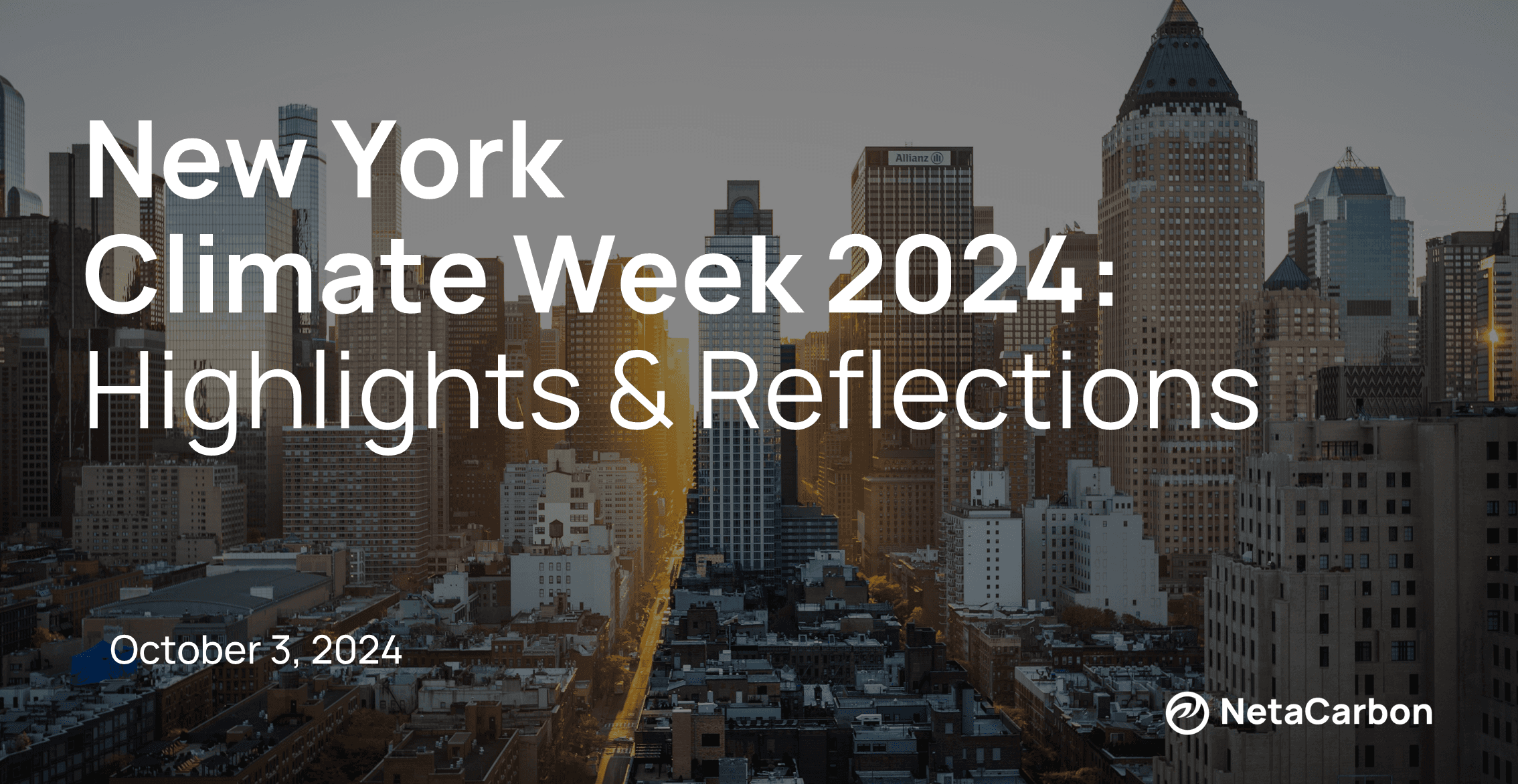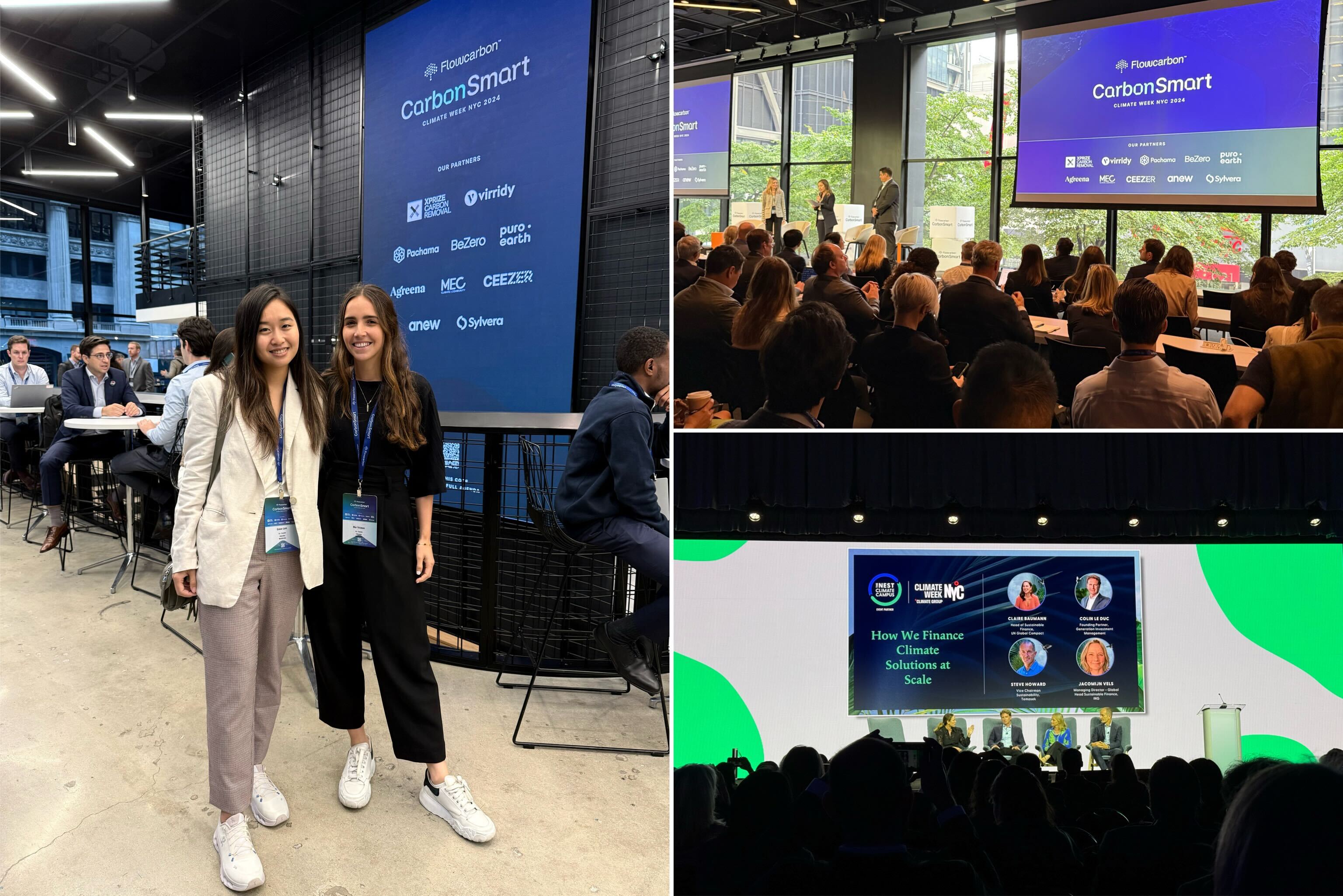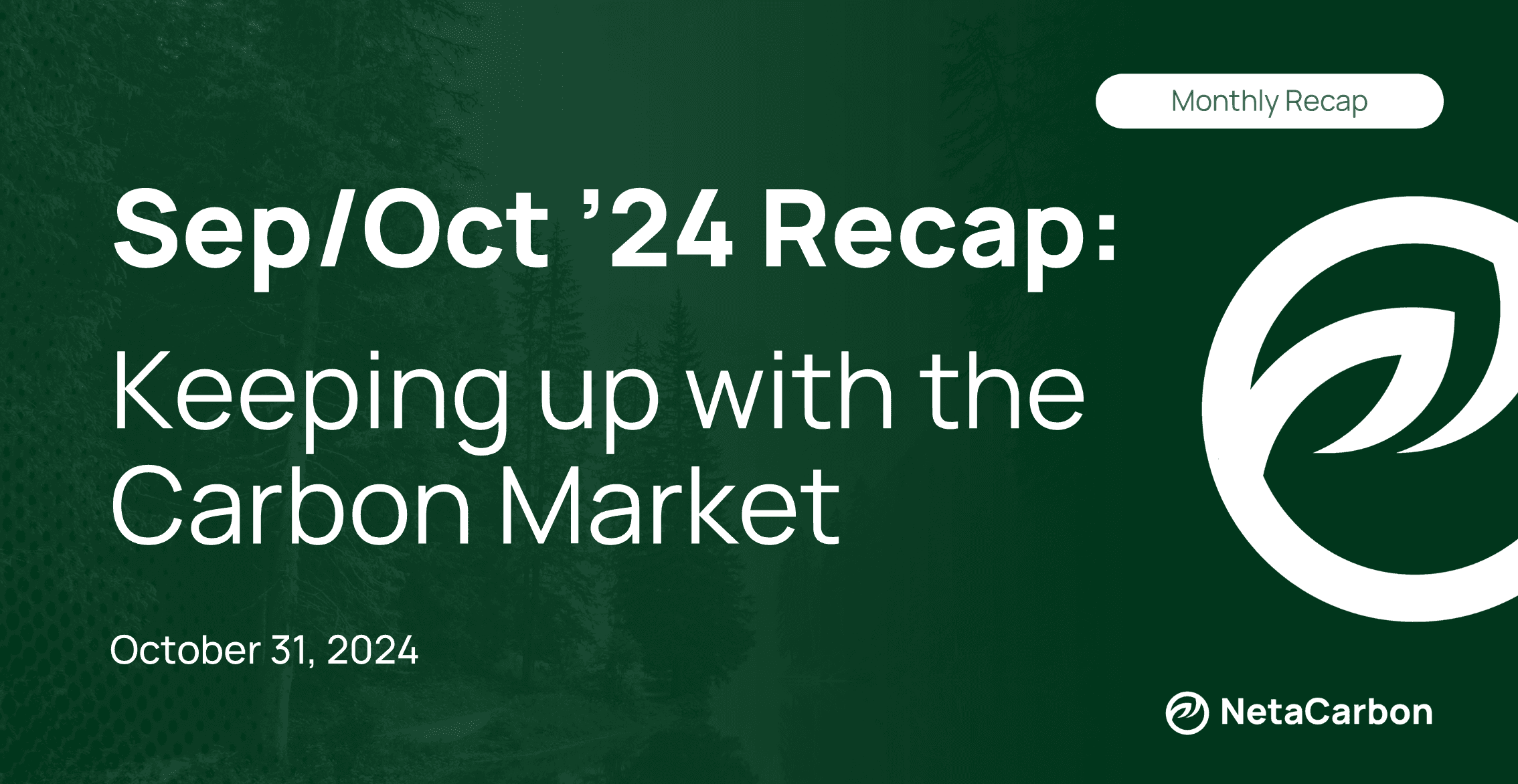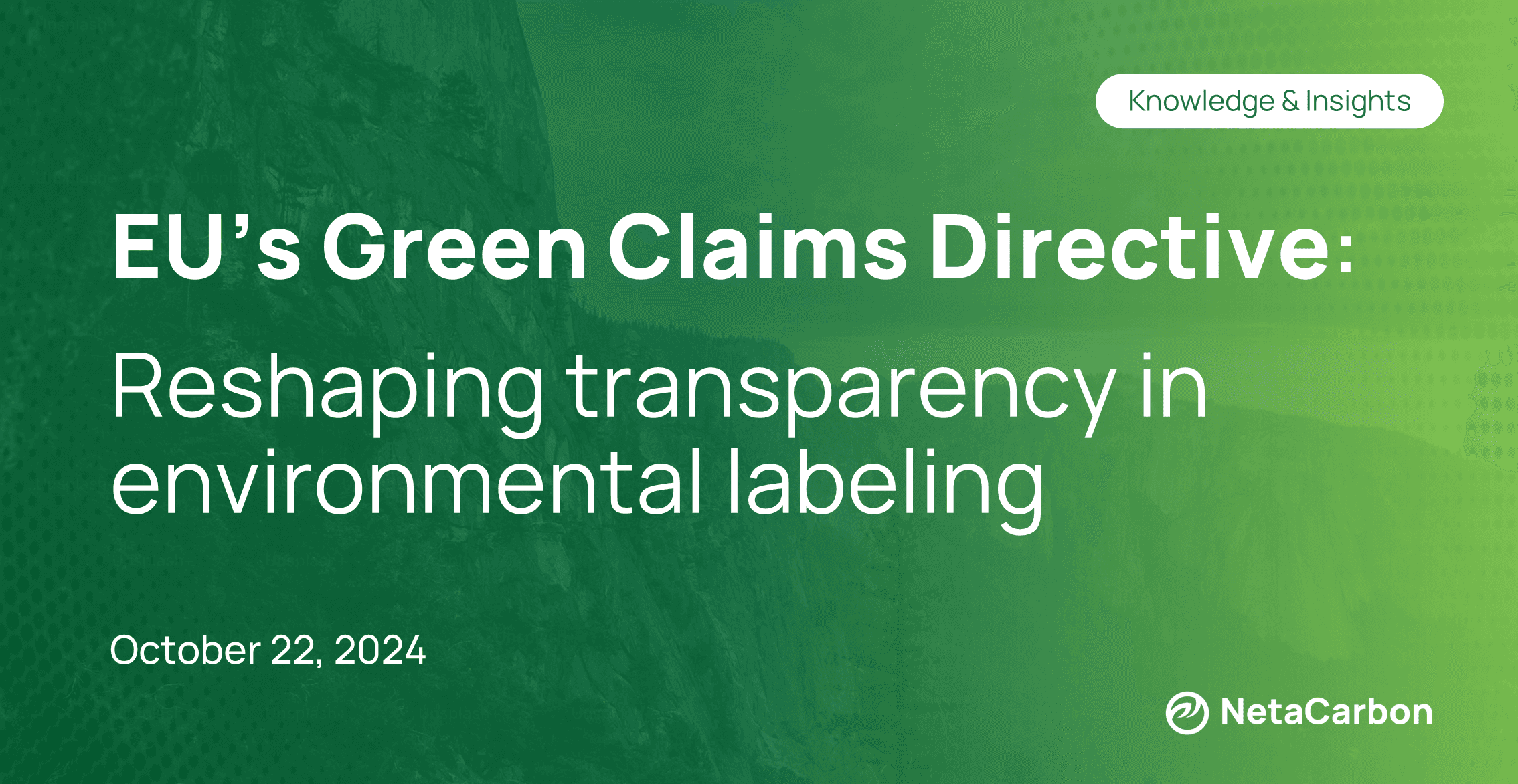New York Climate Week 2024: Highlights and Reflections
New York Climate Week 2024: Highlights and Reflections
New York Climate Week 2024: Highlights and Reflections
COMPANY ANNOUNCEMENT
October 3, 2024

Grace Lam
·
Co-Founder

Mar Velasco
·
Co-Founder
This year’s Climate Week NYC hosted over 100,000 attendees and 600 events - and NetaCarbon was right in the center of action. We co-hosted an oversubscribed panel event (more on that later so keep scrolling!) and met new and familiar faces at events all over the city.
Having previously attended both COP28 and last year’s Climate Week, we shared the same sentiment as many attendees: this time round, the conversations felt more productive and actionable. Outside of the many great panels and keynotes, lots of real work got done.
We’ve had a chance to reflect on our experience, and the implications for the broader carbon market. Here are some of our key takeaways!



1. Collaborations across developers, financiers, and intermediaries are key to unlocking high-integrity demand in a tough market environment.
Most attendees agreed on one thing - the carbon market is in a tough “correction” period as we transition from a legacy market, laden with legitimate concerns around fraud and greenwashing, to a high-quality, high-integrity market, where carbon projects deliver traceable, transparent on-the-ground impact.
This necessitates collaboration: carbon market participants have to work together to deliver the impact demanded by corporate buyers.
On a high level, the following participants are key to a high-quality carbon project:
A buyer who understands the projects they are looking for and can commit to an offtake contract
A developer committing to delivering the highest impact through sharing benefits with local communities, and rigorous monitoring
A financier who can provide up-front capital (if needed) for operations before carbon revenue is generated
These parties are not interacting with each other enough - developers are unclear on investor and buyer needs, hence struggle to secure financing. Consequently, buyers cannot find high-quality projects that meet their needs.
As we engage with buyers and developers first-hand and listen to their needs, we become more confident that NetaCarbon’s work can meaningfully bridge these gaps: creating transparency in this market, and ensuring projects are initiated and developed based on the actual needs of corporate buyers and funders. At the same time, we also understand the importance of intermediaries in creating a liquid and functioning market, and that’s why we are also building partnerships with carbon rating agencies, investment funds, registries, and other industry organizations to create a more collaborative carbon market ecosystem.

2. Building business cases for carbon projects ensures internal buy-in and alignment on the budget, timeline, and scale of investments.
Corporates interested in climate projects encounter challenges in securing internal budgets and buy-in. Some also worry that offsetting emissions with traditional carbon credits might not fit well with future regulatory requirements.
NetaCarbon’s approach resonated with buyers - carbon investments should not be a one-size-fits-all portfolio but need to be created based on each company’s unique targets and criteria. For instance, not every company can afford to build a full portfolio of carbon dioxide removal (CDR) projects at over $100 per ton. Furthermore, a carbon insetting project tied to their scope 3 supply chain emissions could be more strategic than traditional carbon offsets.
Sustainability teams should explore what works best for their organization – building a business case for carbon projects could go a long way to help secure budgets internally across business functions. Carbon investment not only drives climate goals, but also supports wider business objectives including brand equity, employee retention, and supply chain optimization.
Every company, every investment, and every action has a unique narrative. If this resonates with you, reach out to us and discover how to effectively communicate your sustainability impact and empower your carbon journey.
3. Sharing learnings and expertise across the community is critical to support carbon project developers and buyers of various stages.
NetaCarbon co-hosted a highly successful panel and networking event with TaroWorks, focused on data accuracy and transparency in carbon development. The overwhelming interest underscores the pressing need for knowledge sharing in this data-intensive industry. We intentionally capped our capacity to maintain an intimate environment: many participants appreciated the candid and tactical advice from more experienced organizations and left with tangible takeaways they could bring back to the organizations.
“One of the most productive and effective Climate Week events I’ve been to this year.” – A participant

At NetaCarbon, we are committed to sharing our expertise and actively encouraging collaboration. Our event was designed to support emerging carbon market players, providing actionable advice and connections to help them navigate the complex carbon landscape. The traditional format of conferences and plenaries might provide high-level guidance on how to navigate the market, but it is the intimate sharing of ideas, learnings–and sometimes mistakes–that allows newer market participants to learn and grow.
-
Climate Week NYC left us energized and optimistic, having engaged with many climate leaders and practitioners working hard to ensure the carbon market can be a pathway to channel financing to projects that protect and preserve the planet. If you were at Climate Week NYC and didn’t get to meet our team, please don't hesitate to contact us and see how we can support you in your journey!
1. Collaborations across developers, financiers, and intermediaries are key to unlocking high-integrity demand in a tough market environment.
Most attendees agreed on one thing - the carbon market is in a tough “correction” period as we transition from a legacy market, laden with legitimate concerns around fraud and greenwashing, to a high-quality, high-integrity market, where carbon projects deliver traceable, transparent on-the-ground impact.
This necessitates collaboration: carbon market participants have to work together to deliver the impact demanded by corporate buyers.
On a high level, the following participants are key to a high-quality carbon project:
A buyer who understands the projects they are looking for and can commit to an offtake contract
A developer committing to delivering the highest impact through sharing benefits with local communities, and rigorous monitoring
A financier who can provide up-front capital (if needed) for operations before carbon revenue is generated
These parties are not interacting with each other enough - developers are unclear on investor and buyer needs, hence struggle to secure financing. Consequently, buyers cannot find high-quality projects that meet their needs.
As we engage with buyers and developers first-hand and listen to their needs, we become more confident that NetaCarbon’s work can meaningfully bridge these gaps: creating transparency in this market, and ensuring projects are initiated and developed based on the actual needs of corporate buyers and funders. At the same time, we also understand the importance of intermediaries in creating a liquid and functioning market, and that’s why we are also building partnerships with carbon rating agencies, investment funds, registries, and other industry organizations to create a more collaborative carbon market ecosystem.

2. Building business cases for carbon projects ensures internal buy-in and alignment on the budget, timeline, and scale of investments.
Corporates interested in climate projects encounter challenges in securing internal budgets and buy-in. Some also worry that offsetting emissions with traditional carbon credits might not fit well with future regulatory requirements.
NetaCarbon’s approach resonated with buyers - carbon investments should not be a one-size-fits-all portfolio but need to be created based on each company’s unique targets and criteria. For instance, not every company can afford to build a full portfolio of carbon dioxide removal (CDR) projects at over $100 per ton. Furthermore, a carbon insetting project tied to their scope 3 supply chain emissions could be more strategic than traditional carbon offsets.
Sustainability teams should explore what works best for their organization – building a business case for carbon projects could go a long way to help secure budgets internally across business functions. Carbon investment not only drives climate goals, but also supports wider business objectives including brand equity, employee retention, and supply chain optimization.
Every company, every investment, and every action has a unique narrative. If this resonates with you, reach out to us and discover how to effectively communicate your sustainability impact and empower your carbon journey.
3. Sharing learnings and expertise across the community is critical to support carbon project developers and buyers of various stages.
NetaCarbon co-hosted a highly successful panel and networking event with TaroWorks, focused on data accuracy and transparency in carbon development. The overwhelming interest underscores the pressing need for knowledge sharing in this data-intensive industry. We intentionally capped our capacity to maintain an intimate environment: many participants appreciated the candid and tactical advice from more experienced organizations and left with tangible takeaways they could bring back to the organizations.
“One of the most productive and effective Climate Week events I’ve been to this year.” – A participant

At NetaCarbon, we are committed to sharing our expertise and actively encouraging collaboration. Our event was designed to support emerging carbon market players, providing actionable advice and connections to help them navigate the complex carbon landscape. The traditional format of conferences and plenaries might provide high-level guidance on how to navigate the market, but it is the intimate sharing of ideas, learnings–and sometimes mistakes–that allows newer market participants to learn and grow.
-
Climate Week NYC left us energized and optimistic, having engaged with many climate leaders and practitioners working hard to ensure the carbon market can be a pathway to channel financing to projects that protect and preserve the planet. If you were at Climate Week NYC and didn’t get to meet our team, please don't hesitate to contact us and see how we can support you in your journey!
1. Collaborations across developers, financiers, and intermediaries are key to unlocking high-integrity demand in a tough market environment.
Most attendees agreed on one thing - the carbon market is in a tough “correction” period as we transition from a legacy market, laden with legitimate concerns around fraud and greenwashing, to a high-quality, high-integrity market, where carbon projects deliver traceable, transparent on-the-ground impact.
This necessitates collaboration: carbon market participants have to work together to deliver the impact demanded by corporate buyers.
On a high level, the following participants are key to a high-quality carbon project:
A buyer who understands the projects they are looking for and can commit to an offtake contract
A developer committing to delivering the highest impact through sharing benefits with local communities, and rigorous monitoring
A financier who can provide up-front capital (if needed) for operations before carbon revenue is generated
These parties are not interacting with each other enough - developers are unclear on investor and buyer needs, hence struggle to secure financing. Consequently, buyers cannot find high-quality projects that meet their needs.
As we engage with buyers and developers first-hand and listen to their needs, we become more confident that NetaCarbon’s work can meaningfully bridge these gaps: creating transparency in this market, and ensuring projects are initiated and developed based on the actual needs of corporate buyers and funders. At the same time, we also understand the importance of intermediaries in creating a liquid and functioning market, and that’s why we are also building partnerships with carbon rating agencies, investment funds, registries, and other industry organizations to create a more collaborative carbon market ecosystem.

2. Building business cases for carbon projects ensures internal buy-in and alignment on the budget, timeline, and scale of investments.
Corporates interested in climate projects encounter challenges in securing internal budgets and buy-in. Some also worry that offsetting emissions with traditional carbon credits might not fit well with future regulatory requirements.
NetaCarbon’s approach resonated with buyers - carbon investments should not be a one-size-fits-all portfolio but need to be created based on each company’s unique targets and criteria. For instance, not every company can afford to build a full portfolio of carbon dioxide removal (CDR) projects at over $100 per ton. Furthermore, a carbon insetting project tied to their scope 3 supply chain emissions could be more strategic than traditional carbon offsets.
Sustainability teams should explore what works best for their organization – building a business case for carbon projects could go a long way to help secure budgets internally across business functions. Carbon investment not only drives climate goals, but also supports wider business objectives including brand equity, employee retention, and supply chain optimization.
Every company, every investment, and every action has a unique narrative. If this resonates with you, reach out to us and discover how to effectively communicate your sustainability impact and empower your carbon journey.
3. Sharing learnings and expertise across the community is critical to support carbon project developers and buyers of various stages.
NetaCarbon co-hosted a highly successful panel and networking event with TaroWorks, focused on data accuracy and transparency in carbon development. The overwhelming interest underscores the pressing need for knowledge sharing in this data-intensive industry. We intentionally capped our capacity to maintain an intimate environment: many participants appreciated the candid and tactical advice from more experienced organizations and left with tangible takeaways they could bring back to the organizations.
“One of the most productive and effective Climate Week events I’ve been to this year.” – A participant

At NetaCarbon, we are committed to sharing our expertise and actively encouraging collaboration. Our event was designed to support emerging carbon market players, providing actionable advice and connections to help them navigate the complex carbon landscape. The traditional format of conferences and plenaries might provide high-level guidance on how to navigate the market, but it is the intimate sharing of ideas, learnings–and sometimes mistakes–that allows newer market participants to learn and grow.
-
Climate Week NYC left us energized and optimistic, having engaged with many climate leaders and practitioners working hard to ensure the carbon market can be a pathway to channel financing to projects that protect and preserve the planet. If you were at Climate Week NYC and didn’t get to meet our team, please don't hesitate to contact us and see how we can support you in your journey!
Since you made it this far, why not sign up for our newsletter?
Since you made it this far, why not sign up for our newsletter?

Make smarter
packaging decisions
See how we can cut your time spent on packaging compliance and data tracking by half

Make smarter
packaging decisions
See how we can cut your time spent on packaging compliance and data tracking by half

Make smarter
packaging decisions
See how we can cut your time spent on packaging compliance and data tracking by half



